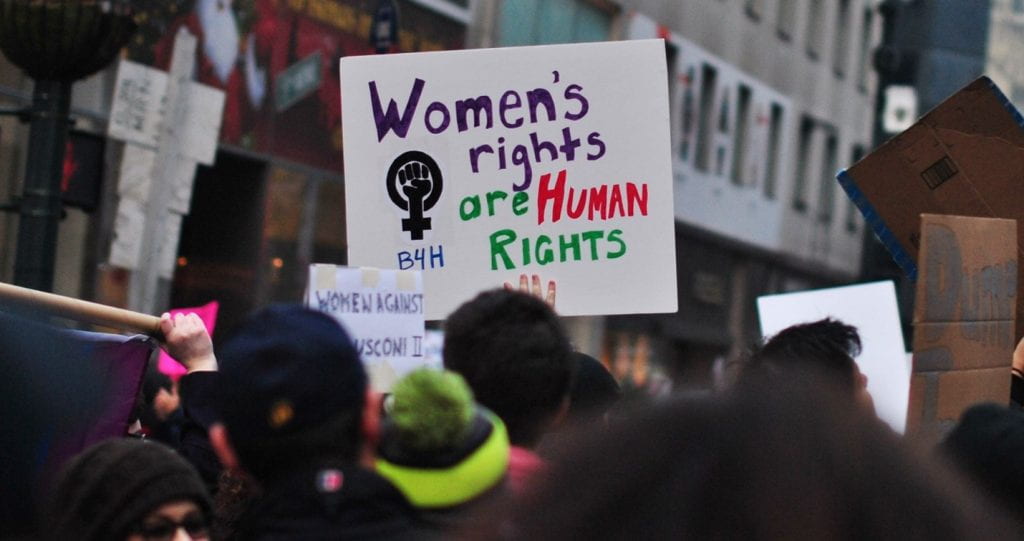This post is authored by Dr. Shilan Fuad Hussain, Marie Sklodowska Curie Postdoctoral Fellow and Senior Research Fellow at the Department of Law and Politics and the Social Policy Research Centre at Middlesex University. More information on her work can be found here.

Photographer: Narih Lee. Source link here.
In many nations around the world, women form a majority of the population. Only in very few nations, however, do they form the majority of positions in government and thus form the majority of voices making decisions impacting domestic and international policy. In this era of democracy and equal rights, there is clearly more that needs to be done. And while we should not overlook just how far women have come in many parts of the world in the last half century, neither should we let this conceal how much further we need to go.
For example, it is estimated that one out of every three women in the world has suffered sexual assault or violence from an intimate partner, while one out of every five women in the world was a “child bride” and married before the age of eighteen. These shocking statistics that affect upwards of one billion women in the world remind us that for all of the symbolic optics we witness in Western nations about women’s empowerment, throughout much of the world, women still live as second-class citizens.
Emblematic of this, only around 10% of countries have a woman as their heads of government (19 out of 193), while only 13 countries (mostly in Europe) have gender-equal cabinets. That lack of institutional power has consequences for the youngest and for the most vulnerable women in the world. A global overview of statistics shows that 104 nations around the world have laws preventing women from working certain jobs, 59 nations have no laws on the books addressing sexual harassment in the workplace, and 18 nations around the world allow husbands to legally prevent their wives from working.
Many women still face external attempts to control their minds and bodies—it is estimated that 130 million girls are denied the human right to education, while 200 million girls and women have undergone female genital mutilation. This robbery of physical agency also leaves women vulnerable during childbirth, resulting in around 300,000 maternal deaths a year (an increase from 287,000 in 2020). Gender inequality also shows up economically throughout the world; the majority of women are involved in agricultural work, but women comprise less than 15% of the world’s landowners.
The common thread in this recipe for inequity is that women lack freedom or protections in their marriages, for their bodies, through their pregnancies, in their workplaces, and in their seats of government. Structurally, many women in the world are purposefully undertaught as children and underpaid as working adults. This only amplifies the obstacles to equity that persist from their underrepresentation in halls of power in most countries worldwide.
Historically, international conflicts have shown that Western nations can come up with hundreds of billions of dollars in arms and weapons for geopolitical proxy wars, but when the issue is guaranteeing basic fundamental freedoms to the majority of the world’s disenfranchised humans (women), the investments are mostly small symbolic acts to give the appearance that the matter is being prioritized.
Because the issue of gender inequality has detrimental impacts on multiple systems across the world due to its systemic nature, there needs to be an internationalized global approach where bodies like the United Nations, including even the Security Council, hold women’s liberation to the same level of importance as other security issues such as the possession of nuclear weapons, or other economic matters such as ensuring access to plentiful, sustainable natural resources. Women and girls must be seen as their own oppressed nation, the largest in the world, and appropriate investments must be made by the global north to protect women’s rights in the global south.
International institutions must also define a global set of standards for women’s equality that is non-negotiable. Unfortunately, many of these oppressive actions carried out against women are justified under the guise of being matters of “cultural” or “religious” differences. But culture or faith cannot be an excuse to deny women their inalienable human rights.
In the same way that the international order eventually allied together to stop racial apartheid in South Africa, they too need to act with the same enthusiasm and moral fortitude in confronting nations around the world who enact gender apartheid and refuse to grant women their equal rights. Only when women’s freedom is considered as strong of a non-negotiable red line as other internationally uniting issues such as the use of chemical weapons will the world be able to curtail many of these structural shackles limiting the horizons and freedoms of the world’s majority: women. And while it is true that women are far more often strong survivors rather than helpless victims, their strength should be a choice, not a requirement for survival.

Dr. Shilan Fuad Hussain is currently a Marie Curie Postdoctoral Fellow in the field of Gender Studies and cultural analysis, and a Senior Consultant for gender-related issues in society. She was previously a Visiting Fellow at the Washington Kurdish Institute (U.S.), and a Doctoral Fellow at the Geneva Centre for Security Policy (Switzerland). She is an interdisciplinary academic and works on a variety of topics, among them: cultural representation, production, and practices; gender-based violence; state policies enhancing female equality; FGM and arranged/forced marriages; the social impacts of masculinity; and multi-identity and culture in the diaspora. Her current work sits at the intersection of sociology and cultural analysis, and its symbiotic relevance to modern society.
Personal website: https://www.shilanfuadhussain.com/


Be First to Comment